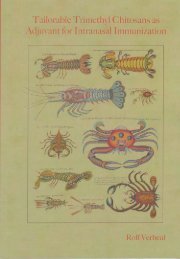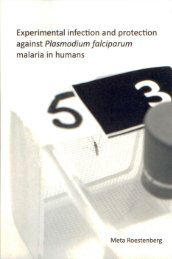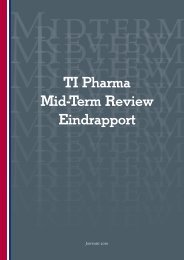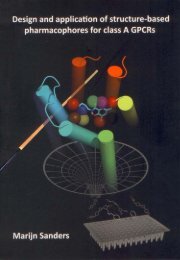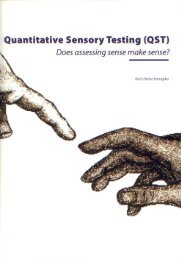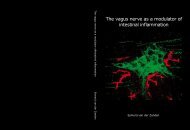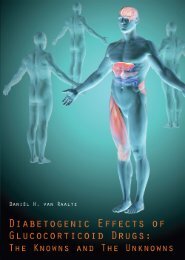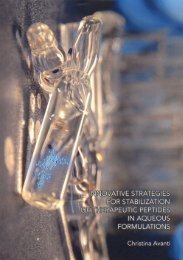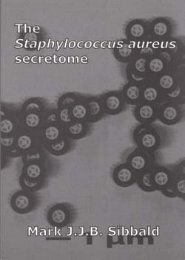towards improved death receptor targeted therapy for ... - TI Pharma
towards improved death receptor targeted therapy for ... - TI Pharma
towards improved death receptor targeted therapy for ... - TI Pharma
You also want an ePaper? Increase the reach of your titles
YUMPU automatically turns print PDFs into web optimized ePapers that Google loves.
Chapter 3<br />
P38 and JNK have opposing effects on TRAIL‐induced apoptosis<br />
P38 and JNK have been described to mediate both pro‐ and anti‐apoptotic activities<br />
depending on the stimulus applied and the cell type studied [23]. In order to explore their<br />
role in TRAIL‐induced apoptosis in NSCLC cells we employed selective chemical JNK and<br />
p38 inhibitors. As shown in Fig. 2a, JNK inhibition with SP600125 resulted in enhanced<br />
TRAIL‐induced cell <strong>death</strong> in H460 cells, indicating anti‐apoptotic activity of JNK. P38<br />
inhibition with SB203580, on the other hand, decreased the level of cell <strong>death</strong>, indicating<br />
that p38 has pro‐apoptotic activity in TRAIL signaling (Fig. 2b). The chemical inhibitors<br />
SP600125 and SB203580 have been generated against the ATP binding pockets of JNK and<br />
p38, respectively, and do not affect the phosphorylation status of the kinases themselves<br />
or only partially in case of autophosphorylation [24;25]. As a control and in line with this<br />
we did not observe a decrease in TRAIL‐dependent phosphorylation of JNK and p38 in the<br />
presence of these inhibitors (Fig. 2f). Furthermore, at concentrations lower than 25 µM<br />
hardly any significant cross‐inhibition of other MAPKs have been reported, which has been<br />
linked to the unique binding properties of these chemicals in the ATP‐binding sites of the<br />
enzymes [26]. Nonetheless, to further corroborate our findings we also employed specific<br />
siRNAs against JNK and p38 that upon transfection strongly reduced the expression of<br />
these kinases in H460 cells when compared to control siRNA transfected cells (Fig 2c, d). In<br />
resistant A549 cells, JNK and p38 inhibition did not significantly affect TRAIL‐dependent<br />
apoptosis (Fig. 2a, b). Next, the effect of kinases inhibition on TRAIL‐induced caspases<br />
activation was studied by Western blotting following 3 or 24 h treatment. JNK inhibition by<br />
SP600125 appeared to stimulate caspase‐8, Bid, RIP1, caspase‐9, caspase‐3 and PARP<br />
cleavage, as judged by more intense cleaved products and/ or a decrease in the full length<br />
proteins (Fig. 2e). Inhibition of p38 with SB203580 in combination with TRAIL hardly<br />
affected cleavage of caspase‐8, Bid and RIP1, whereas cleavage of caspase‐9, caspase‐3<br />
and PARP was somewhat decreased compared to TRAIL alone.<br />
‐ 46 ‐



